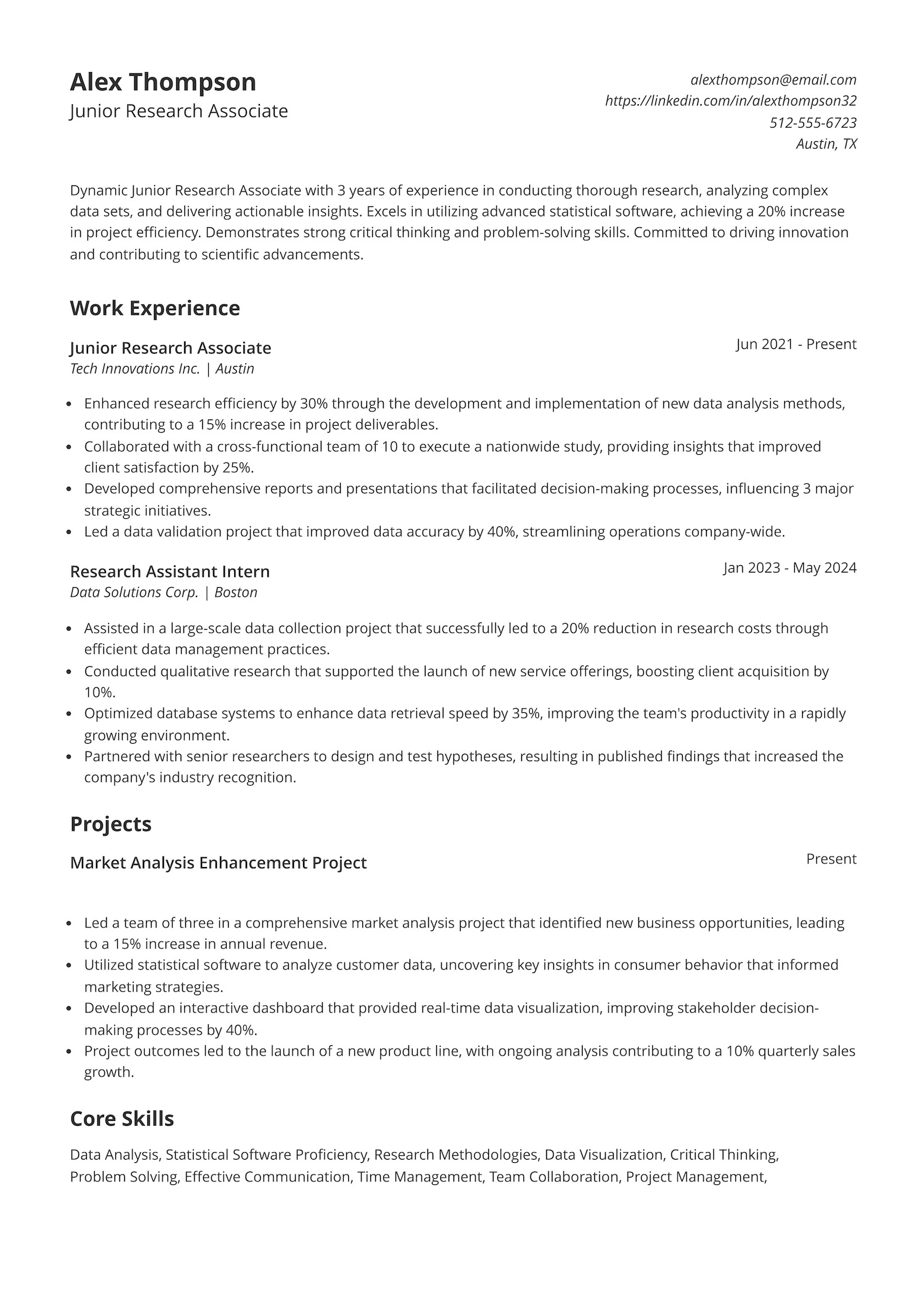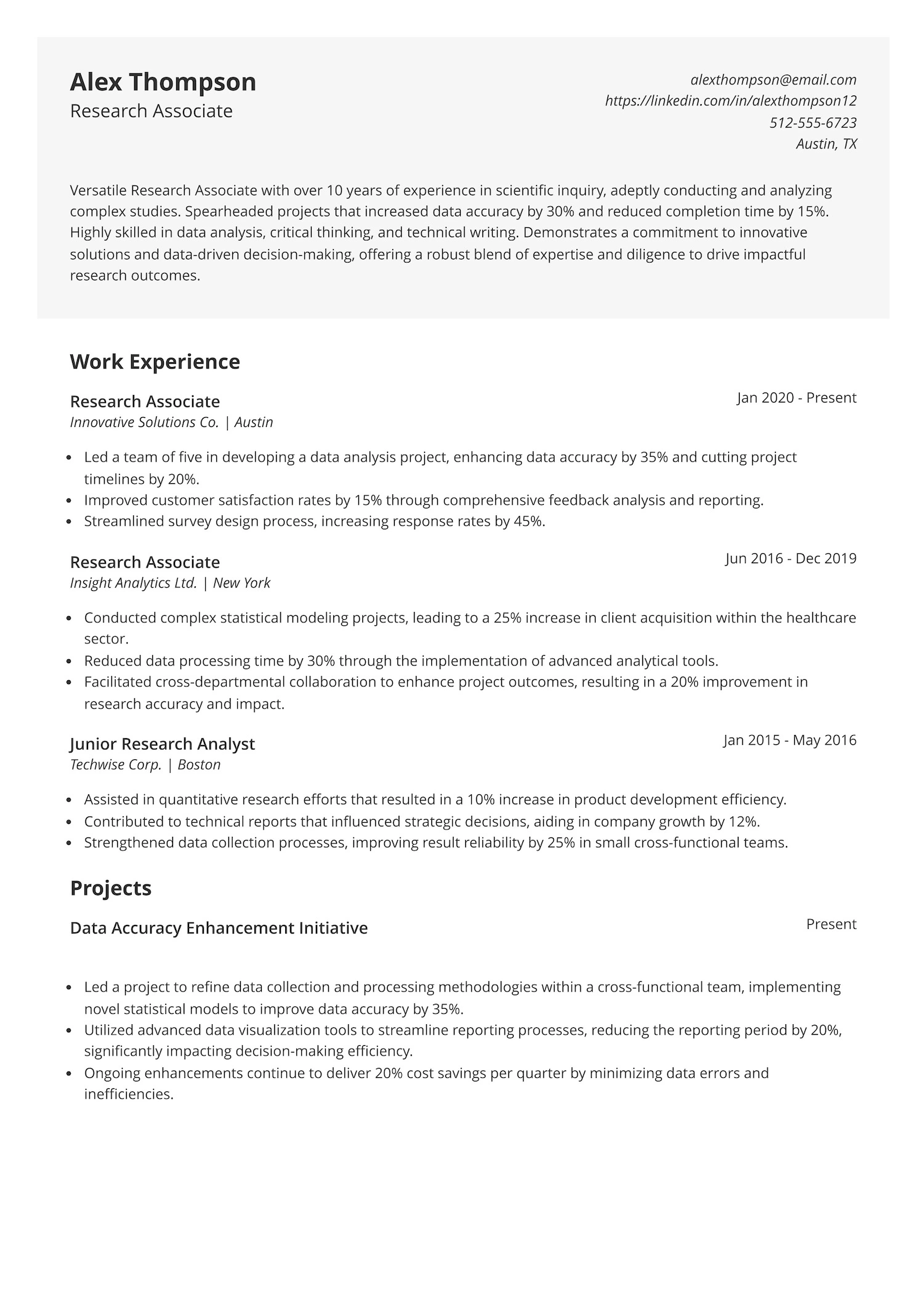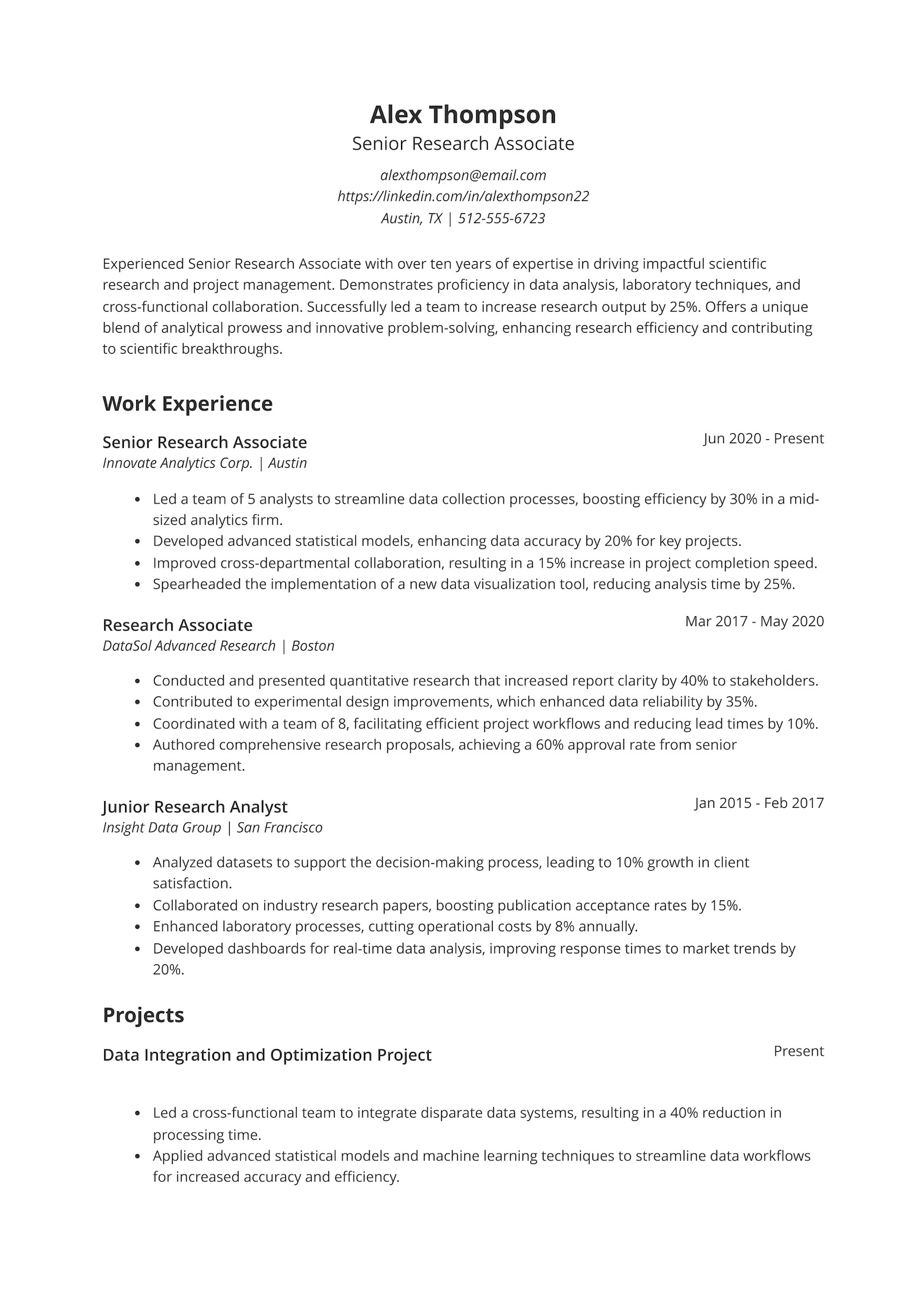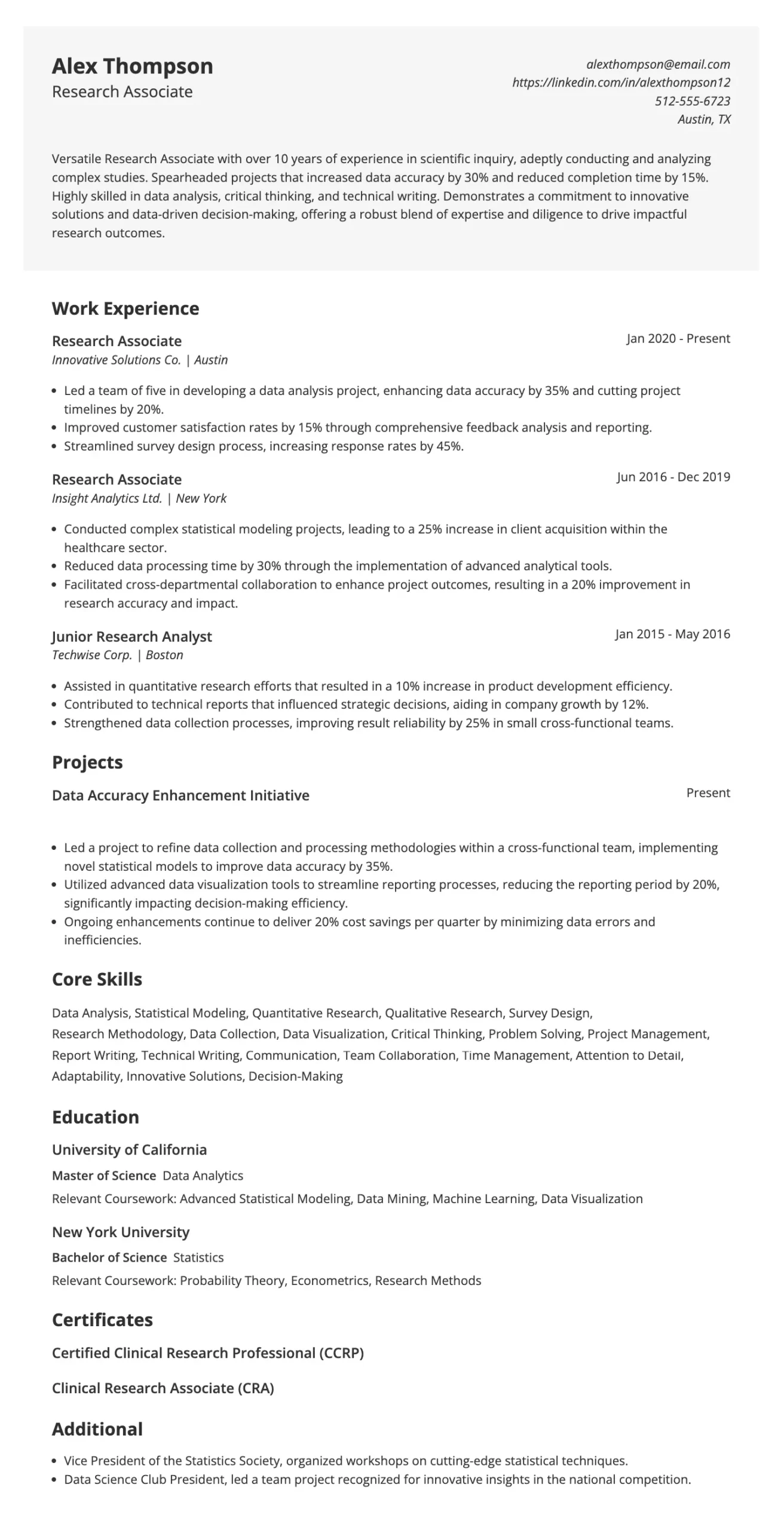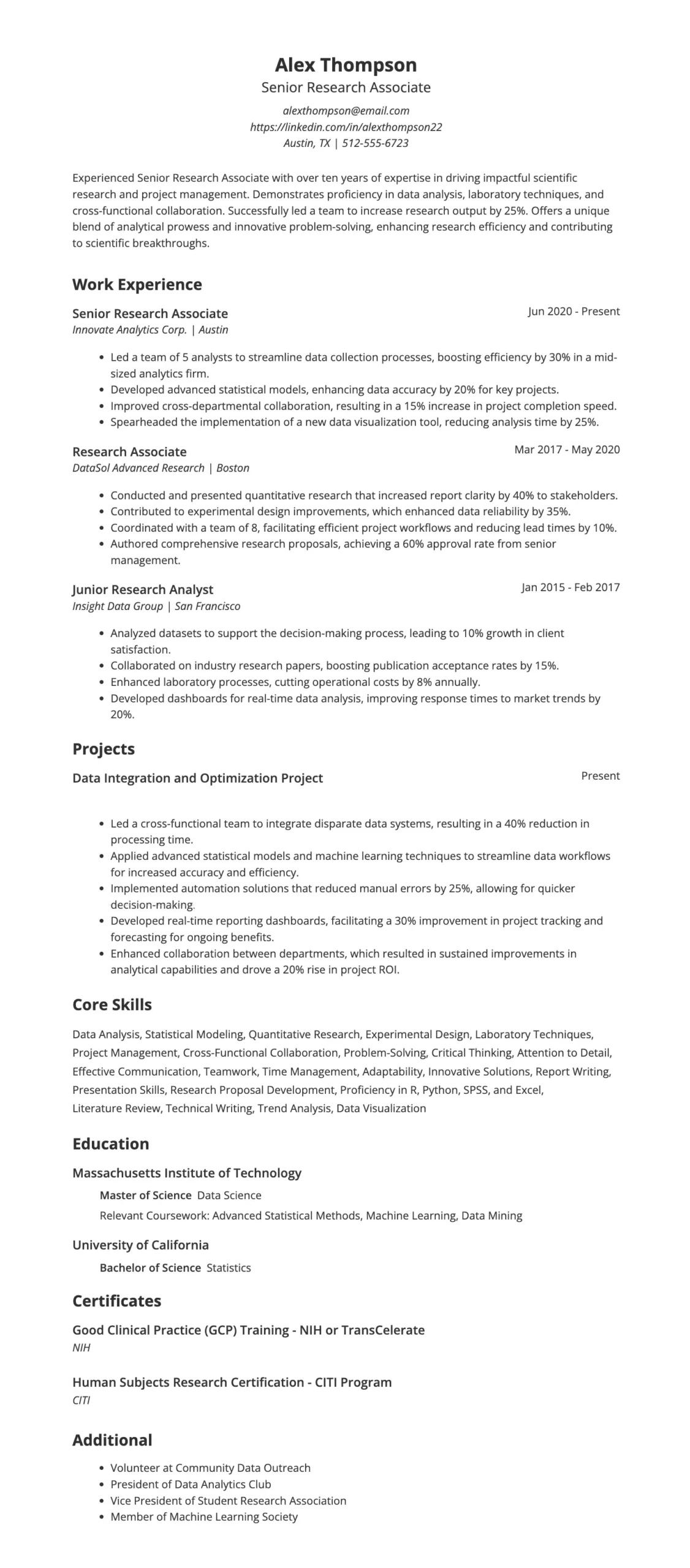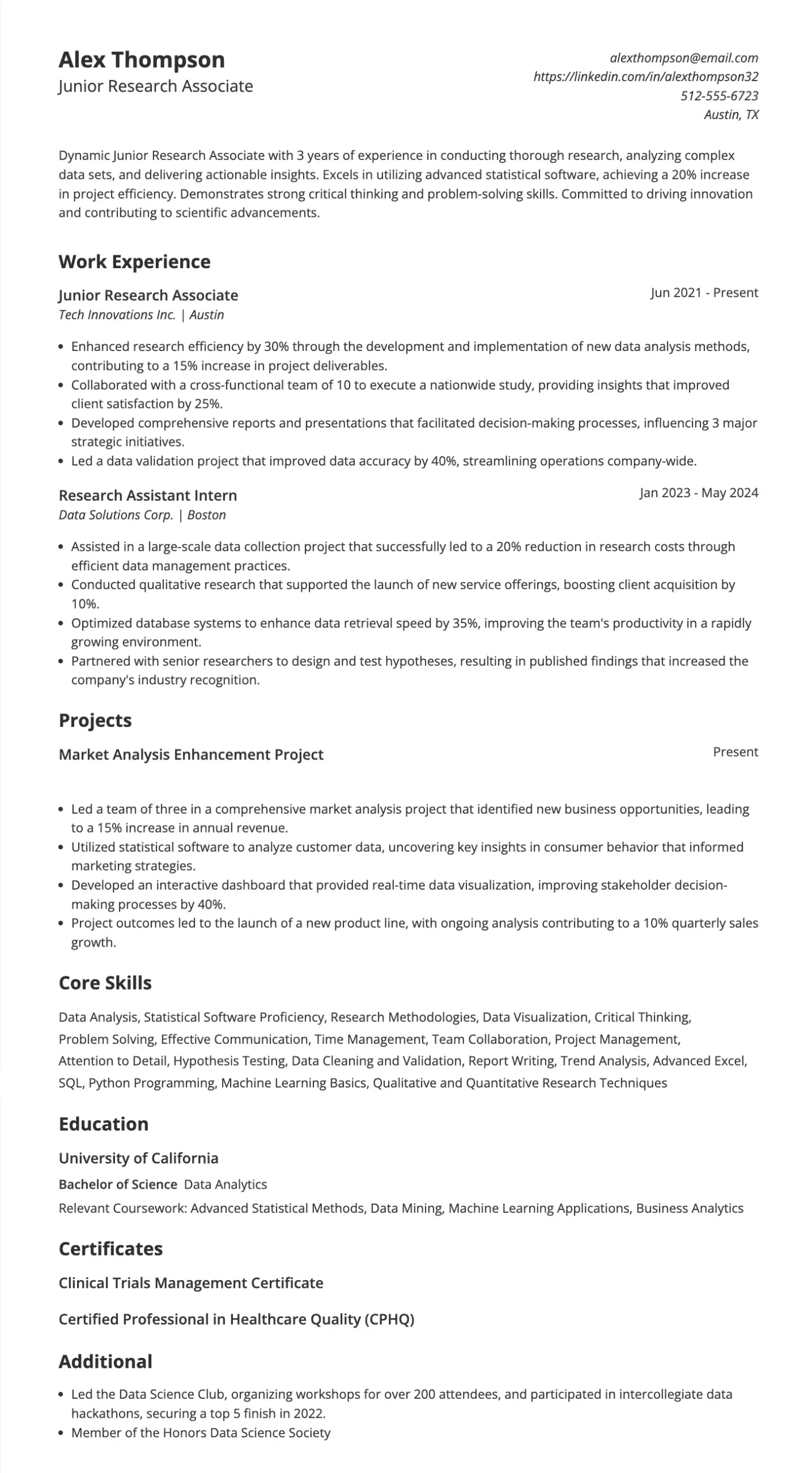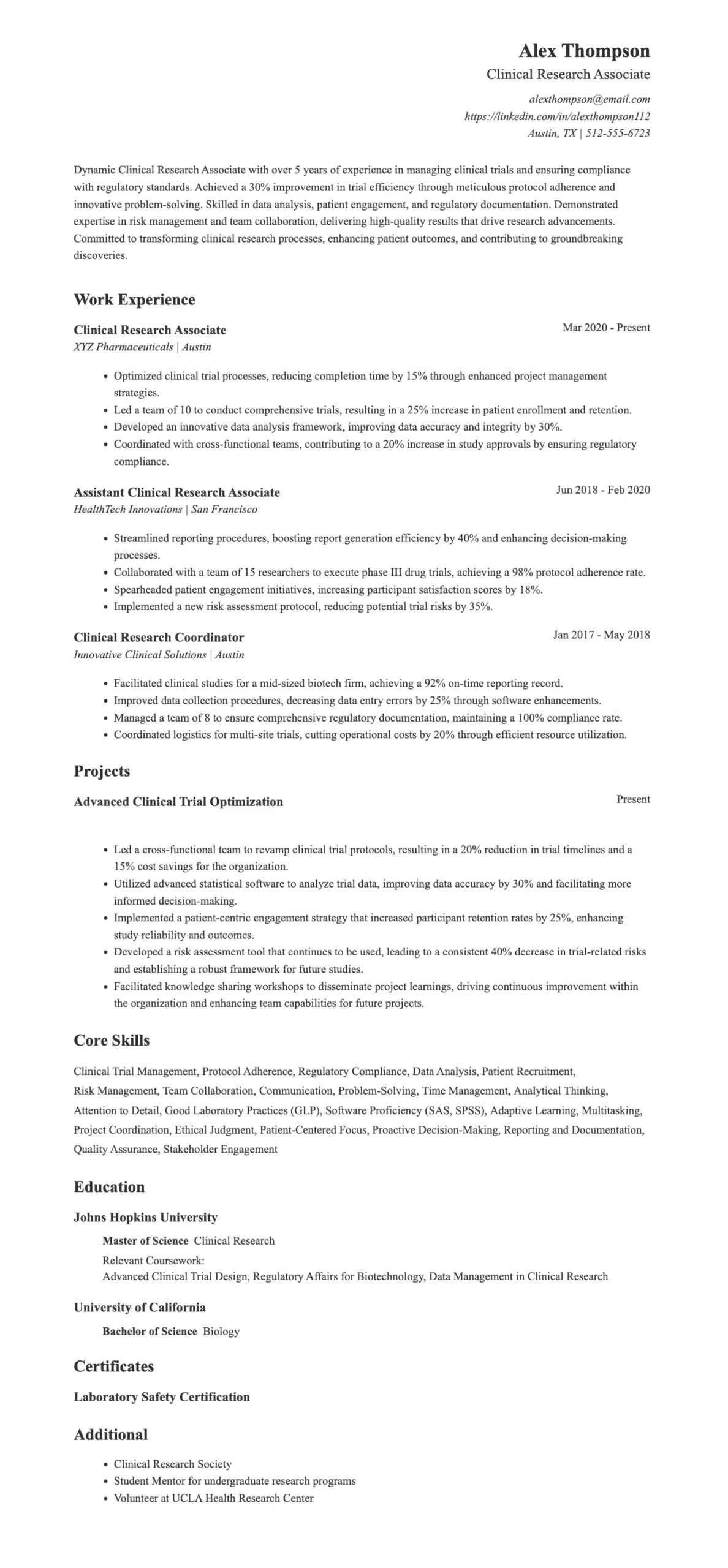Research Associate Resume Examples & Tips for 2025
Tired of sending resumes with no response? Explore our research associate resume examples tailored for 2025 and learn how to highlight your skills and achievements the right way.

July 15, 2025

Ever feel like your research contributions are impressive, but your research associate resume doesn’t quite reflect that? You’re not alone. Securing a job in today’s competitive and detail-oriented world of research is not just about what you’ve discovered or published—it’s how effectively you communicate that experience on paper that grabs the attention of the hiring managers.
Many research associates struggle to strike the right balance between technical depth and clear, concise presentation. How do you summarize lab techniques, data analysis, or publications without overwhelming the reader, or worse, under-representing your impact? On top of that, resume standards evolve, and what worked a few years ago may not cut it in 2025. That’s exactly what this guide is here to help you with.
In this guide, we’ll walk you through real-world examples, formatting tips, and content strategies that highlight your strengths and help you avoid common pitfalls. If you’re looking to land interviews and get noticed in a crowded applicant pool, this is where you start.
Research associate resume example
If you’re aiming to land a research associate position, your resume needs to stand out in a crowded field. A well-written resume can make all the difference, showcasing your skills and experience in a way that resonates with hiring managers. This resume template does exactly that. Check it out for some inspiration.
As a research associate, your role is all about precision, analysis, and contributing to the success of critical projects. Employers expect candidates to have a strong foundation in data analysis, research methodologies, and clear communication skills. Beyond technical abilities, they look for someone proactive, adaptable, and capable of managing multiple tasks efficiently.
This resume clearly showcases the candidate’s leadership and technical expertise in research. Key achievements like improving data accuracy by 35% and reducing project timelines by 20% demonstrate a focus on efficiency and measurable results, essential in research roles.
Including certifications such as CCRP and CRA adds credibility, while proficiency in tools like data visualization software highlights the candidate’s ability to innovate. These factors make the candidate a strong fit for roles requiring advanced data analysis and project management skills, making them capable of driving improvements in research outcomes and operational efficiency.
Senior research associate resume example
Anyone looking for a resume tailored to a Senior Research Associate role can use our resume example. Drawing inspiration from this example, write a compelling resume for yourself, and learn how to present both technical expertise and leadership experience in the best possible light.
In a senior research associate role, your ability to manage projects, analyze complex data, and collaborate with various teams is crucial. Your resume must reflect the essential qualities needed, such as proficiency in data analysis tools, clear communication, and a results-driven approach. Employers expect candidates to show leadership in optimizing processes, managing teams, and delivering high-quality research outputs.
This resume effectively highlights the candidate’s extensive experience in research and project management, demonstrating a proven ability to lead teams and enhance efficiency. With achievements like increasing research output by 25% and reducing analysis time by 25%, it showcases a measurable impact.
The intense focus on technical skills, including advanced statistical modeling and proficiency in tools like R, Python, SPSS, and Excel, proves the candidate’s expertise in data analysis. The track record of cross-functional collaboration and successful project management, combined with prestigious academic credentials from MIT, makes the candidate a top contender for roles requiring leadership and technical proficiency.
Junior research associate resume example
If you’re looking to kickstart your career as a junior research associate, this resume example is the perfect starting point. Learn how to write a standout resume that reflects your contributions and sets you apart in a competitive job market.
A junior research associate’s resume should emphasize both technical expertise and the ability to collaborate across teams. Employers are looking for candidates with a solid foundation in data analysis, research methodologies, and proficiency in statistical software like Python and SQL. It’s important to highlight your ability to deliver insights, manage projects, and support team initiatives while demonstrating your problem-solving skills and adaptability in a fast-paced environment.
This resume highlights a strong foundation in research, data analysis, and project management. The professional summary emphasizes key achievements, such as a 20% increase in project efficiency, while showcasing the candidate’s commitment to scientific advancements.
The work experience section further reinforces their ability to drive results, with tangible impacts like improving data accuracy by 40% and increasing client satisfaction by 25%. The core skills section underscores proficiency in crucial areas like statistical software, data visualization, and machine learning basics, positioning the candidate as highly capable for roles that demand technical expertise and problem-solving abilities.
Clinical research associate resume example
This resume example is a great template for anyone seeking to advance in clinical research. Take inspiration from this resume to effectively showcase your experience and demonstrate your impact in the field.
When applying for a clinical research associate position, your resume should clearly demonstrate your expertise in managing clinical trials, adhering to protocols, and ensuring regulatory compliance. Employers will expect candidates to have strong analytical and problem-solving abilities and the capacity to collaborate across teams and manage multiple tasks effectively. Your resume should emphasize your hands-on experience in trial management, patient engagement, and data analysis, showing how you’ve contributed to improving outcomes and streamlining processes.
By demonstrating expertise in clinical research, with tangible achievements like a 30% improvement in trial efficiency and a 25% increase in patient enrollment, the resume presents the candidate as a perfect fit. The candidate’s ability to optimize processes, lead teams, and ensure regulatory compliance is evident throughout their work experience.
Furthermore, notable project contributions, such as developing a risk assessment tool, showcase the candidate’s proactive approach and commitment to improving clinical research outcomes. This resume positions the candidate as an impactful, results-driven professional.
How to write a research associate resume that will get you an interview
Strong research experience or expertise isn’t enough—you need a resume that can impress human hiring managers and is ATS-friendly.
Most employers use applicant tracking systems (ATS) to organize resumes before reaching a hiring manager’s desk. If your resume isn’t optimized for ATS, it could be missed, no matter how qualified you are.
Understanding how an ATS works is essential to writing a resume that gets noticed. Think of an ATS like a search engine: it scans resumes based on how closely they match the job description using keywords, skills, and job titles.
Here’s a breakdown of how the process works:
- Job posting setup: Recruiters enter critical info like job title, required qualifications, and essential skills into the ATS.
- Resume scanning: When you apply, the ATS scans your resume, pulling details like work experience, skills, and education.
- Searchable database: Every scanned resume is stored in a database that hiring managers can search using specific terms.
And here’s where many job seekers get stuck: figuring out how to write a resume manually can feel overwhelming. That’s why Jobscan’s Free resume builder is a game-changer. Built with ATS optimization in mind, it doesn’t just help you write a resume—it helps you write the right resume.
Optimize your resume
Use Jobscan's resume scanner to ensure your research associate resume is ATS-friendly and includes all the necessary keywords from the job description.
Scan your resume
Key elements of a research associate resume
Your resume must be more than a list of job titles. A high-impact research associate resume communicates your technical skills, research experience, and value to potential employers. Below are the key elements that every job seeker should include to create a resume that is both ATS-friendly and appealing to hiring managers:
- Contact information: Include your full name, phone number, professional email address, and LinkedIn profile. Make sure it’s up to date and easy to find.
- Professional summary: Write a brief 2–3 sentence overview of your years of experience, areas of expertise, and your value to a research team.
- Core skills: List your most relevant technical skills, such as statistical software, data visualization tools, electronic data capture, and good communication skills.
- Work experience: Outline your relevant work experience, focusing on research projects, patient enrollment, data collection, and project management. Use action verbs and quantify your impact whenever possible.
- Projects: Include standout research projects where you contributed to data analysis, clinical trials, or received additional funding due to project success.
- Education: List your academic background in reverse chronological order.
- Certifications: Highlight any certifications, such as Certified Clinical Research Professional (CCRP) or related qualifications, that validate your expertise.
- Honors and awards: Include any recognitions for academic excellence, research achievements, or contributions to your research team. These add credibility to your professional experience.
Write a strong professional summary
Your professional summary is the first impression a hiring manager or ATS gets from your resume. It should be a concise, targeted pitch that highlights your most relevant research experience, technical skills, and career achievements. A well-written summary shows employers exactly why you’re the perfect candidate, without making them search for it.
Good examples of a resume summary
- “Detail-oriented research associate with 5+ years of experience in clinical research trials, data analysis software, and patient enrollment. Proven track record of supporting drug discovery projects and maintaining high standards in data integrity and good clinical practice.”
- “Analytical and highly organized professional with a master’s degree in molecular biology and hands-on experience in statistical software, electronic data capture, and managing complex data sets. Skilled in collaborating with cross-functional teams to drive efficient, compliant research outcomes.”
Bad examples of a resume summary
- “I am looking for a job where I can use my research skills and grow my career. I work hard and am a team player.”
- “Research associate with some experience. Willing to learn and do my best in any position.”
Want help writing a summary that actually works? Jobscan’s Summary Generator uses proven hiring data to create personalized summaries highlighting your strengths, integrating relevant keywords, and improving your chances of getting noticed. It’s the smarter, faster way to write a summary that works.
Demonstrate key research associate skills
To build a strong and competitive resume, it’s essential to highlight both hard and soft skills that reflect your capability to manage clinical trials, handle complex data sets, and collaborate with a research team. These skills help showcase your ability to contribute effectively across different phases of a research project, from planning and data collection to analysis and reporting.
Hard skills for research associate
- Statistical Software (e.g., SPSS, SAS, R)
- Data Analysis Software
- Electronic Data Capture (EDC) Systems
- Good Clinical Practice (GCP) Compliance
- Research Methodologies
- Data Integrity and Quality Control
- Patient Enrollment Procedures
- Clinical Trial Monitoring
- Data Visualization Tools (e.g., Tableau)
- Technical Report Writing
Soft skills for research associate
- Strong Analytical Skills
- Good Communication Skills
- Time Management
- Problem Solving
- Attention to Detail
- Collaboration and Teamwork
- Adaptability in Fast-Paced Environments
- Project Management
- Ethical Decision-Making
- Initiative and Self-Motivation
Highlighting these skills in bullet points, especially those that match the job description, can boost your chances of standing out in an ATS search and showing hiring managers you’re well-prepared for the role. Here are some good and bad examples to inspire you to write compelling bullet points that make your resume stand out.
Write impactful resume bullet points for a research associate
Resume bullet points are the core of your experience section. They should clearly communicate your skills, the impact you’ve made, and the value you bring to a team. Instead of listing tasks, focus on what you accomplished using specific tools, action verbs, and measurable results. Here’s what that looks like:
Good examples of resume bullet points
- “Conducted data analysis on over 150 clinical trial participants using statistical software, resulting in a 20% improvement in reporting accuracy.”
- “Supported drug discovery projects by coordinating with a cross-functional research team, ensuring timely delivery of key milestones.”
- “Maintained data integrity by managing electronic data capture systems and implementing quality control protocols.”
Bad examples of resume bullet points
- “Worked with data and did reports.”
- “Helped with some research tasks.”
- “Used software for trials.”
Jobscan’s Bullet Point Generator is a powerful feature that can help you turn generic job duties into impactful, keyword-rich achievements tailored to your industry. It’s an easy way to showcase your actual value—and impress hiring managers.
Highlight your achievements as a research associate
Achievements help transform your resume from a list of responsibilities to a compelling story of impact. As a research associate, it’s essential to show how your work made a difference, whether through improved processes, successful clinical trials, or breakthroughs in data analysis. Focus on results, use numbers when possible, and tie your success to larger project outcomes.
Here are some strong examples of achievements to inspire your own:
- “Played a key role in a clinical research trial that reduced patient dropout rates by 25% through improved patient enrollment strategies.”
- “Developed and maintained SOPs for data collection and integrity, reducing reporting errors by 30%.”
- “Utilized data analysis software to analyze complex datasets across three research projects, contributing to two peer-reviewed publications.”
- “Collaborated with a research team to secure additional funding for a drug discovery project through comprehensive technical reporting.”
- “Streamlined data entry processes by implementing a new electronic data capture system, cutting data processing time by 40%.”
Tailor your resume to the job description
One of the most effective ways to boost your chances of landing an interview is to tailor your resume to each job description. A generic resume might get lost in the shuffle, especially with ATS screening resumes based on keyword relevance. Customizing your resume shows hiring managers that you’re qualified and the right fit for their team.
Here’s how to tailor your resume to the job description:
- Identify and use keywords from the job posting (e.g., clinical trials, research tools, Certified Clinical Research Professional).
- Match your skills and experience to those listed in the job description.
- Use the same or a similar job title to align with what the employer is looking for.
- Customize your professional summary with the most relevant qualifications and experience.
- Reflect the tone and priorities of the employer, such as collaboration, communication, or analytical focus.
Include relevant education & certifications
Your education and certifications are key proof points of your qualifications, especially in fields that demand specialized knowledge and compliance with industry standards. Placing this information clearly on your resume helps you stand out to hiring managers and applicant tracking systems.
Here’s how to include relevant education and certifications in your resume:
- List your highest degree first (e.g., Bachelor’s or Master’s Degree), your major, university name, and graduation year.
- Only include your GPA if it’s 3.5 or above and you’re early in your career.
- Place certifications in a separate section labeled “Certifications” to make them easy to find.
- Include the full name of the certification, the issuing organization, and the date received or expiration (if applicable).
- Tailor certifications to match job requirements, especially those mentioned in the job description.
Top research associate certifications
Listing industry certifications can set you apart and enhance your resume:
- Certified Clinical Research Professional (CCRP)
- Clinical Research Associate (CRA) Certification – ACRP
- Good Clinical Practice (GCP) Training – NIH or TransCelerate
- Human Subjects Research Certification – CITI Program
- Clinical Trials Management Certificate
- Certified Professional in Healthcare Quality (CPHQ)
- Laboratory Safety Certification
- Data Management and EDC Systems Certification
- Biostatistics and Statistical Software Certification
Research associate resume tips
To land a research associate role, your resume must be clear, concise, and results-driven. Follow these expert tips to create a compelling resume that grabs attention:
- Use action verbs to start bullet points (e.g., analyzed, coordinated, implemented).
- Include quantifiable achievements to show real impact (e.g., “reduced data entry errors by 30%”).
- Optimize your resume with keywords from the job description so your resume is easily searchable in the ATS.
- Tailor your resume for each application to match the specific role and industry focus.
- Keep formatting clean and professional with clear section headings and consistent font.
- List certifications and training relevant to clinical research or lab-based work.
- Showcase your experience with research methodologies, data integrity, and regulatory compliance.
- Limit your resume to 1–2 pages and prioritize the most relevant work experience.
- Proofread carefully to eliminate spelling or grammar mistakes—accuracy matters in research roles.
Include a cover letter with your research associate resume
A cover letter is your opportunity to provide a personalized introduction to hiring managers, giving them a deeper understanding of your qualifications and passion for the position. While your research associate resume highlights your experience and skills, a well-written cover letter demonstrates your enthusiasm for the role and why you’re the perfect fit.
Here are some tips to remember when writing your cover letter:
- Personalize it: Address the cover letter to the hiring manager by name whenever possible. Show that you’ve researched the company and understand their goals and projects.
- Explain your motivation: Express why you’re passionate about the specific role and how your research experience aligns with the company’s needs.
- Showcase soft skills: Besides technical expertise, emphasize soft skills like communication, collaboration, and your ability to work well in a team-based environment.
- Keep it concise: A cover letter should be no longer than one page. Make every sentence count—avoid fluff and focus on what makes you an excellent fit for the job.
- Call to action: Close your letter by expressing your interest in an interview and your eagerness to discuss how you can contribute to the company’s success.
Writing a perfect cover letter can be time-consuming, but it doesn’t have to be difficult. Jobscan’s cover letter generator simplifies the process by helping you create a personalized cover letter highlighting your most relevant experience and aligning with the job description. Let Jobscan take the guesswork out of writing a cover letter that works!
Final words
Creating a standout research associate resume in 2025 means more than just listing your skills and experiences—it’s about telling a compelling, results-driven story that gets past the ATS and into the hands of hiring managers. Whether you’re a seasoned clinical researcher or just starting out, your resume should reflect your strengths with clarity, confidence, and precision.
Ready to take your resume to the next level? Don’t leave your career to chance—leverage Jobscan’s suite of powerful tools. From optimizing your resume for ATS, generating tailored bullet points, to writing personalized summaries and cover letters, Jobscan helps you create a resume that works for you, not against you.
Try it out today and put yourself in the best position to land interviews and secure the research associate role you’ve been working toward.

Research associate common interview questions
How do you handle data integrity and ensure accuracy in your research?
Answer:
“I take data integrity very seriously and follow strict protocols to ensure accuracy. In my previous role, I worked closely with electronic data capture (EDC) systems to enter and verify data, conducting regular checks for consistency. I also used automated tools to identify discrepancies and ensure that all research data met the highest quality standards and compliance with regulatory requirements.”
Can you explain a time when you faced a challenge in a research project and how you overcame it?
Answer:
“In one of my previous projects, we encountered a data inconsistency issue during a clinical trial. To resolve this, I led a team to review and cross-check the data from various sources. We identified the root cause: a flaw in the data entry process. I then worked with the IT team to implement new validation checks within our EDC systems to prevent this from happening in future trials.”
How do you prioritize tasks when managing multiple research projects?
Answer:
“I prioritize tasks by evaluating deadlines, project impact, and resource requirements. I use a project management tool to track all ongoing tasks and milestones. For example, during overlapping research projects, I ensure that critical data collection and patient enrollment deadlines are met first, while allocating enough time for data analysis and report writing. Regular communication with my research team also helps ensure we are aligned on priorities.”
How do you ensure compliance with ethical guidelines and regulations in your research?
Answer:
“I am committed to adhering to ethical guidelines and regulatory standards, such as Good Clinical Practice (GCP) and HIPAA. In my past roles, I regularly attended training sessions on research ethics and kept myself updated on any regulatory changes. For example, in a recent clinical research trial, I ensured that all patient consent forms were properly documented and that data was handled securely according to ethical and legal standards.”
What is your experience with patient enrollment in clinical research studies?
Answer:
“I have extensive experience managing patient enrollment for clinical trials. In my last role, I worked directly with study coordinators to screen and recruit eligible participants, ensuring all informed consent documentation was completed and accurately recorded. I also maintained detailed records of patient interactions to ensure compliance with regulatory requirements and good clinical practice.”
Research associate resume frequently asked questions
What are the most important research associate skills to highlight on a resume?
Focus on technical skills like data analysis software, statistical tools, clinical trial monitoring, and electronic data capture, alongside soft skills like attention to detail, communication, and project management to show you’re well-rounded.
How do I include my education experience in a research associate resume?
List your degree, major, university name, and graduation year. Mention relevant coursework, research projects, or lab experience that align with the role. Highlight academic honors, if any, and include certifications or trainings in a separate section.
How should I write a resume if I have no experience as a research associate?
Emphasize transferable skills from internships, academic research, or lab work. Highlight relevant coursework, data analysis, or project management experience. Use a strong summary, include certifications, and tailor your resume to match job descriptions.
